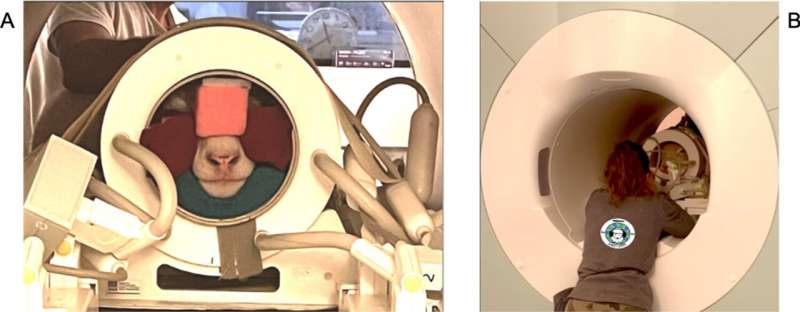A group of sheep. Credit: INRAE - Sophie Normant
Magnetic resonance imaging (MRI) is a technique commonly used to explore the brain of sheep. Until now, it was only performed under general anesthesia, to ensure the immobility of the animal. Anesthesia, however, leads to stress and other negative side effects, in addition to compromising the study of brain activity.
A research team from INRAE has developed a training protocol tailored to sheep in order to perform MRI acquisition on animals while they are awake, without the need for restraint. To do this, the researchers relied on previous work with dogs, which until now were the only animal species capable of performing this type of protocol.
In the nursery of the experimental research unit of the Animal Physiology Facility (UEPAO), located at the INRAE Val de Loire center in Nouzilly, the researchers began a familiarization phase as soon as the lambs were born. The objective was to identify which animals were most sensitive to being petted or having foam objects placed next to their heads.
The paper was published in the journal Behavioral Research Methods.
After the selection of 10 lambs, an initial training phase took place at the Nouzilly sheep farm. The research team trained the animals to climb a ramp to reach an MRI scanner and then lie down. The lambs were also taught to place their heads on an MRI model coil.
Once in the real MRI chamber, the sheep were able to reproduce the same behavior very easily, but had some difficulty staying completely still. It took several weeks for the animals to get used to the machine’s vibrations and to stop moving for a few minutes. Ultimately, the MRI images of their brains were comparable to those obtained from anesthetized sheep, a goal that was initially achieved in six of the ten trained sheep at the time of writing, and has since been achieved in nine sheep. The protocol lasted nine months, from the birth of the lambs to the first MRI acquisitions.

Sheep performing brain MRI acquisition. A Head position on sheep RF coil. The head is “blocked” with pieces of foam adapted to each individual. A trainer is at the front of the pit with one hand on the sheep’s back; B The other trainer sat at the back of the pit, facing the sheep, to maintain visual contact. Credit: Behavioral Research Methods (2024). DOI: 10.3758/s13428-024-02449-6
The success of this protocol is already opening new avenues for research in animal neuroimaging (eg, fMRI) – as it makes it possible to study brain function in intelligent animals. A study examining the activation of certain brain regions in relation to hearing is currently underway and is the subject of a Ph.D. thesis that relies on this training protocol.
This example of voluntary cooperation between trainer and sheep illustrates the animal’s ability to learn and highlights the importance of human-animal relationships in the development of innovative methods. The study also opens up new possibilities for training other animals to perform smart MRI scans. Such training methods can have many other applications, in areas such as shearing or medical training – when the animal learns to cooperate during veterinary care.
More information:
Camille Pluchot et al, Sheep (Ovis aries) training protocol for voluntary unconstrained and unconstrained structural brain MRI acquisitions, Behavioral Research Methods (2024). DOI: 10.3758/s13428-024-02449-6
Provided by INRAE - National Research Institute for Agriculture, Food and Environment
citation: Researchers train sheep to complete smart MRI imaging (2024, July 1) retrieved July 2, 2024 from https://phys.org/news/2024-07-sheep-mri-imaging.html
This document is subject to copyright. Except for any fair agreement for study or private research purposes, no part may be reproduced without written permission. The content is provided for informational purposes only.